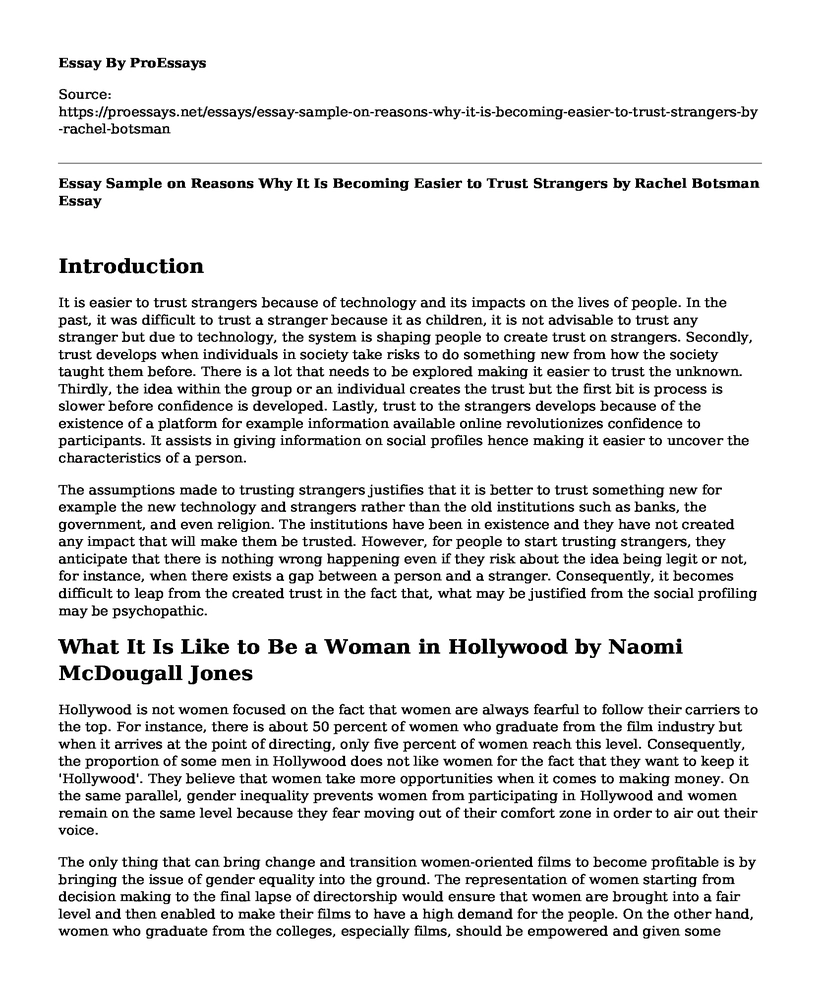Introduction
It is easier to trust strangers because of technology and its impacts on the lives of people. In the past, it was difficult to trust a stranger because it as children, it is not advisable to trust any stranger but due to technology, the system is shaping people to create trust on strangers. Secondly, trust develops when individuals in society take risks to do something new from how the society taught them before. There is a lot that needs to be explored making it easier to trust the unknown. Thirdly, the idea within the group or an individual creates the trust but the first bit is process is slower before confidence is developed. Lastly, trust to the strangers develops because of the existence of a platform for example information available online revolutionizes confidence to participants. It assists in giving information on social profiles hence making it easier to uncover the characteristics of a person.
The assumptions made to trusting strangers justifies that it is better to trust something new for example the new technology and strangers rather than the old institutions such as banks, the government, and even religion. The institutions have been in existence and they have not created any impact that will make them be trusted. However, for people to start trusting strangers, they anticipate that there is nothing wrong happening even if they risk about the idea being legit or not, for instance, when there exists a gap between a person and a stranger. Consequently, it becomes difficult to leap from the created trust in the fact that, what may be justified from the social profiling may be psychopathic.
What It Is Like to Be a Woman in Hollywood by Naomi McDougall Jones
Hollywood is not women focused on the fact that women are always fearful to follow their carriers to the top. For instance, there is about 50 percent of women who graduate from the film industry but when it arrives at the point of directing, only five percent of women reach this level. Consequently, the proportion of some men in Hollywood does not like women for the fact that they want to keep it 'Hollywood'. They believe that women take more opportunities when it comes to making money. On the same parallel, gender inequality prevents women from participating in Hollywood and women remain on the same level because they fear moving out of their comfort zone in order to air out their voice.
The only thing that can bring change and transition women-oriented films to become profitable is by bringing the issue of gender equality into the ground. The representation of women starting from decision making to the final lapse of directorship would ensure that women are brought into a fair level and then enabled to make their films to have a high demand for the people. On the other hand, women who graduate from the colleges, especially films, should be empowered and given some opportunities in the film industry especially Hollywood in order to have a propensity of making their dreams come true. The resulting of this makes Hollywood women more profitable. Moreover, the idea of keeping the name Hollywood hindered women from utilizing chances in the platform to transform themselves. The ban of such a phenomenon will ensure that women are far much better transformed thereby making more women film more profitable.
Cite this page
Essay Sample on Reasons Why It Is Becoming Easier to Trust Strangers by Rachel Botsman. (2022, Oct 24). Retrieved from https://proessays.net/essays/essay-sample-on-reasons-why-it-is-becoming-easier-to-trust-strangers-by-rachel-botsman
If you are the original author of this essay and no longer wish to have it published on the ProEssays website, please click below to request its removal:
- Non-Verbal Communication Speech Example
- Essay Sample on Team Working: Dangers & Costs of Poor Care for Patients
- Essay Example on Gender Targeting: Reducing Reach or Unlocking Potential?
- Research Paper on Parent-Teacher Partnership: A Key to Child Success
- Black Power Movement: Actors, Political Orgs and Events - Essay Sample
- Thesis Sample on Preventing CLABSIs: The Ideology Behind Psychiatric Nursing
- Free Paper on Tobacco Abuse: A Growing Global Threat to Human Health







